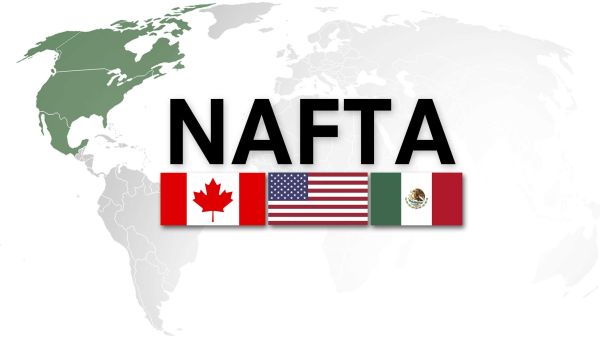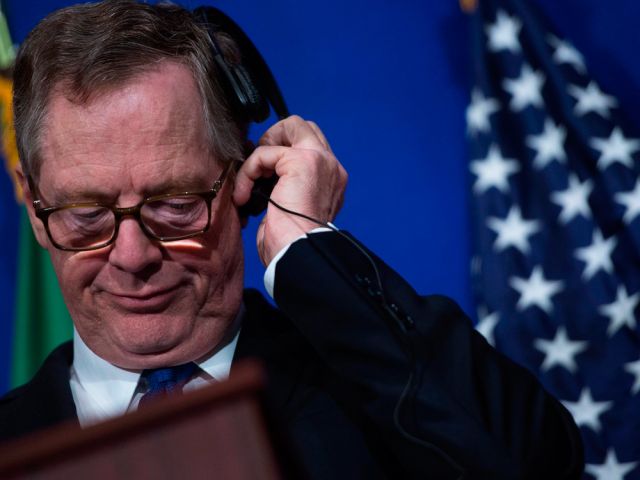
by Editor | May 25, 2021 | World
 Mexico City : Negotiations to modernise the North American Free Trade Agreement (NAFTA) are unlikely to reach an accord in principle by May 17, Mexican Economy Minister Ildefonso Guajardo said on Tuesday.
Mexico City : Negotiations to modernise the North American Free Trade Agreement (NAFTA) are unlikely to reach an accord in principle by May 17, Mexican Economy Minister Ildefonso Guajardo said on Tuesday.
The three NAFTA partners, Mexico, Canada and the US, continue to disagree on several issues, he said.
“The possibility that by Thursday we will have all of the negotiation (wrapped up) is not likely. We don’t think it will happen by Thursday,” Xinhua quoted Guajardo as saying .
May 17 loomed as a deadline for a preliminary agreement after Paul Ryan, the speaker of the US House of Representatives, last week said that for Congress to approve a revamped NAFTA, an agreement in principle had to be submitted by then.
Otherwise, Congress would not have enough time to debate and approve a new deal before legislative elections in November.
“The conditions are still not there at this time,” affirmed Guajardo, who heads Mexico’s negotiating team.
Among the issues the three sides have yet to agree on is a US proposal to include a so-called sunset clause that would allow the deal to automatically expire every five years, pending renewal. Neither Canada nor Mexico wants that.
However, the trio may be closer to agreeing on automotive rules of origin that place caps on the amount of foreign-made parts allowed in vehicles manufactured in North America, said Guajardo.
Washington wants less foreign-made parts and more US-made components, while Canada and Mexico want to preserve the existing limits.
—IANS

by Editor | May 25, 2021 | World

Ildefonso Guajardo
Mexico City : Mexico’s economy secretary has said here that much remains to be done before negotiations with the US and Canada on updating the 1994 North American Free Trade Agreement can be deemed a success.
Among the “very important” matters that remain to be settled are dispute-resolution mechanisms, rules of origin in the automotive sector and rules for agricultural trade, Ildefonso Guajardo told a press conference in Mexico City on Tuesday, Efe news reported.
“We are still at the negotiating table discussing a series of issues that have to be accommodated in a way that is positive for the three countries,” he said. “A negotiation cannot be declared successful until all of its issues are resolved.”
The next round of talks is scheduled for May 7.
US President Donald Trump took office in 2017 vowing to scrap NAFTA if the accord could not be amended to his satisfaction and the process of revision began last summer.
The original idea was to conclude the negotiations by the end of 2017 to avoid NAFTA’s becoming an issue in this year’s Mexican presidential campaign or the mid-term congressional elections in the US.
But the talks have turned out to be more difficult than expected.
Regarding automotive rules of origin, Guajardo said that he has been meeting with executives from Mexico’s auto sector to draft an alternative to the latest US proposal, which is seen as likely to harm Mexican assembly plants and part-makers.
—IANS

by Editor | May 25, 2021 | World
 Mexico City : Mexico, Canada and the US will hold their eighth round of negotiations to revise the North American Free Trade Agreement in early April, and to accelerate the process they will conduct a series of working meetings – involving cabinet officers – before the talks, Mexican Economy Minister Ildefonso Guajardo said on Monday.
Mexico City : Mexico, Canada and the US will hold their eighth round of negotiations to revise the North American Free Trade Agreement in early April, and to accelerate the process they will conduct a series of working meetings – involving cabinet officers – before the talks, Mexican Economy Minister Ildefonso Guajardo said on Monday.
At a press conference after the end of the seventh round of talks to update NAFTA, Guajardo said that the new round will take place during the “first part of April,” meaning that authorities in the three member nations have “five weeks” to consider their options and prepare, Efe reported.
“It’s not that there’s just going to be one meeting, but rather a working group” will hold assorted meetings in Washington, Mexico City, Ottawa and Toronto.
Moreover, negotiators will discuss working agendas regarding “associated issues that are very close to being resolved.”
He also said that during the coming five weeks the ministers tasked with recrafting and updating NAFTA, which went into effect in 1994 and the renegotiation of which US President Donald Trump had demanded, will be in contact with one another and meet to begin “getting an idea about comprehensive solutions” on issues of “great complexity.”
Guajardo said that the site for the eighth negotiation round has yet to be established, but it is expected that it will be in Washington since the sixth round was held in Montreal and the seventh – which lasted from Feb. 25 through March 5 – in the Mexican capital.
He said that Mexican President Enrique Peña Nieto’s government is ready to negotiate up until the last day of his presidency, Nov. 30.
US Trade Representative Robert Lighthizer said that the new pact should be concluded “quickly” because of the nearness of the Mexican presidential election – scheduled for July 1 – and the US mid-term elections in November.
Lighthizer said Monday that it was regrettable that negotiators had only managed to conclude discussions on three of the issue areas during the seventh round, although Guajardo was more positive and said that now agreement had been reached on six of the 30 NAFTA issues areas.
—IANS

by Editor | May 25, 2021 | World
 By Barry Ellsworth,
By Barry Ellsworth,
Trenton, Canada: Representatives from Canada, the U.S. and Mexico agreed Monday that progress has been made as the sixth round of a renegotiated North American Free Trade Agreement (NAFTA) ended in Montreal.
In his closing remarks at a press conference, U.S. Trade Representative Robert Lighthizer said he hoped the Montreal talks would lead to “major breakthroughs” when talks resume in Mexico City in February.
But Lighthizer also berated Canada for accusing the U.S. of misusing anti-dumping tariffs and subsequently filing about 200 trade complaints against the U.S. with the World Trade Organization.
He called the move an “unprecedented” and “massive attack” on U.S. trade laws.
Regarding NAFTA, some background was provided as the sixth round developed.
The Americans want it to be voluntary for countries to participate in Chapter 11, or the investor-state dispute settlement system as it is called, where companies can sue countries over their domestic laws for what they consider discriminatory measures.
Canada and Mexico proposed that Chapter 11 would apply to them, but the Americans could opt out.
The Americans want a five-year automatic termination clause for NAFTA, at which time renegotiations would begin. Mexico and Canada said the uncertainty would chill investment. Canada offered some counterproposals, including a commission that would regularly check and update how the agreement is working.
Canada has not made any proposals in the area of dairy products, where the U.S. wants Canada’s limit on imports of milk, cheese and poultry ended within 10 years.
The Americans want a limit on the number of contracts Canadian and Mexican companies can bid on, a measure that would push U.S. President Donald Trump’s “Buy American” dictate.
The countries are also discussing the auto industry, but Lighthizer said two compromise proposals that would see a reduction in American-made parts in vehicles – the U.S. is calling for 85 percent – were unacceptable.
Canadian Foreign Affairs Minister Chrystia Freeland said at the news conference that despite some bellicose comments from those involved, she was more positive after the sixth round ended.
She said negotiations are characterized by “dramatic” statements.
“That’s how these things work,” Freeland said.
—AA

by Editor | May 25, 2021 | Business, Large Enterprise, World

Robert Lighthizer
Ottawa : Canada has “thrown a grenade” at the US filing a complaint with the World Trade Organisation (WTO) against its southern neighbour’s use of trade sanctions, which might wreck their current North American Free Trade Agreement (NAFTA) negotiations, said an international trade law expert.
“The odds are increasing that the United States might withdraw from NAFTA, which I’ve been of the view that it would be unlikely to do,” said Mark Warner, who runs MAAW Law, an international business and regulatory law firm in Toronto and New York City, in an interview, Xinhua reported on Friday.
The WTO revealed on Wednesday that Canada had filed a complaint last month accusing the US of unfairly imposing countervailing and anti-dumping duties, not only on Canadian softwood lumber but also on goods from many other countries.
In a statement, US Trade Representative Robert Lighthizer pushed back against Canada’s case against the US, warning that Canada’s “request for consultations at the WTO is a broad and ill-advised attack on the US trade remedies system”.
It also might result in a flood of imports from other countries — if the complaint successfully have American tariffs removed — and cost Canada billions of dollars in exports to the US, Lighthizer said.
Warner believes that the Canadian government may be playing to a domestic audience in demonstrating that it is not only being “very assertive” in addressing trade disputes, but that it is also trying to “embarrass the Americans” before the world by citing almost 180 trade breaches over two decades against other countries listed on 24 pages of Canada’s 32-page complaint before the WTO.
However, Canada’s strategy is “particularly unwise”, Warner told Xinhua.
He said that during the current NAFTA negotiations, which enter the sixth round in Canada later this month, the US has made it clear that it wants to remove a dispute-resolution mechanism for anti-dumping and countervailing cases under Chapter 19 of the 24-year-old trilateral trade agreement.
“If Canada loses Chapter 19, it would have to go to the WTO,” said Warner.
However, he explained that US President Donald Trump’s administration “dislikes” the WTO’s dispute-settlement body and believes that countries rely on it “inappropriately to achieve results they can’t achieve through negotiations”.
Yet while “the rest of the world is trying to keep the US engaged in that dispute-settlement system”, Canada’s generic complaint against the United States is “counterproductive”, said Warner.
—IANS

 Mexico City : Negotiations to modernise the North American Free Trade Agreement (NAFTA) are unlikely to reach an accord in principle by May 17, Mexican Economy Minister Ildefonso Guajardo said on Tuesday.
Mexico City : Negotiations to modernise the North American Free Trade Agreement (NAFTA) are unlikely to reach an accord in principle by May 17, Mexican Economy Minister Ildefonso Guajardo said on Tuesday.



